Ecoteclab, the green makers of Togo
Published 10 January 2017 by Caroline Grellier
Ecoteclab, makerspace dedicated to ecological initiatives, has just emerged in the Togolese capital. Meeting with a community of young enthusiasts at the first Togo Maker Fest.
Lome, correspondence
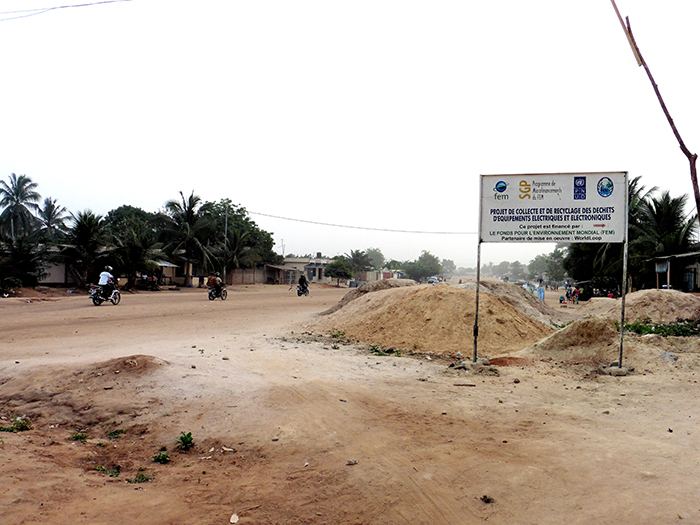
In Adidogome, huge district north-east of Lome town center, the moto-taxi driving me races down a sand road then stops under a mango tree. We ask for directions: “Opposite the Amadahome CEG, not far from the Adidogome technical high school.”
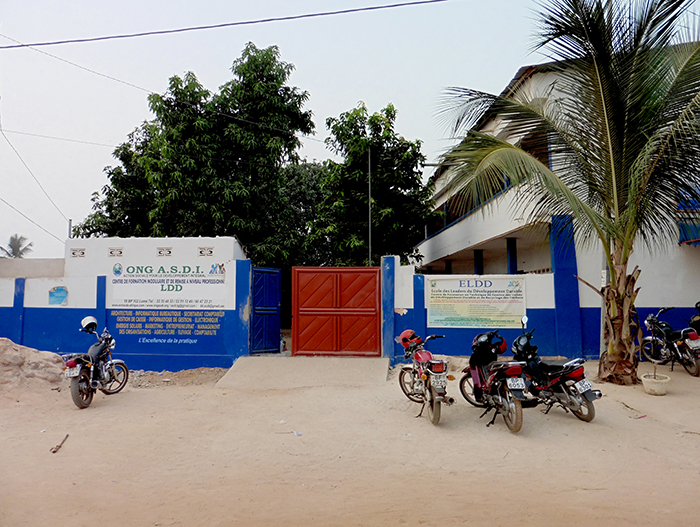
I arrive in front of the blue and white façade of the Leaders of Sustainable Development School (ELDD), that accommodates the Ecoteclab makerspace. At the source of the school, the Asdi association, in charge of collecting electric and electronic equipment waste for the last two years, is providing a classroom for makers.
The origin of Ecoteclab goes back to 2012, when a bunch of friends studying sustainable development at the African Institute for administration and commercial studies (IAEC) and the Agoenyive university Institute (IUA/Esiba) decided to get together to favor the implementation of their teachings. Among them, Kodjo Bruno Kabata and Ousia Foli-Bebe, environmentalist, Komi Joël Gbenyedzi, founder of Green Energy International, who wants to bring DIY solutions by putting technology in the service of ecology.
To begin with, the young makers intend to raise awareness among the Togolese about the importance of trees. They set up humidity sensors at a traffic light in Dekon, a district with no trees where computer and household electrical equipment is sold, and in the Anani Santos park. The data collected will serve as proof of their demonstration, distributed through the Tech228 website and the blog Envi228 newsrun by Armand Eklou, member of the community.
“Practice in school was difficult, so we told each other we would get together to try and learn things together through DIY. I knew some were into DIY but I didn’t know it was a worldwide movement! Gathering data is essential for our studies. In Togo, we cannot access it easily if it exists. We need to produce it by ourselves.”
Ousia Foli-Bebe, co-founder of Ecoteclab
ELDD, convinced of the educational advantages of prototyping, is calling upon Ecoteclab to take part in its “systems of renewable energies” training that concerns about 300 young people. On September 9, 2016, Ecoteclab was officially created.
Ever since, the four friends have been working hard to increase the community. By way of inauguration, the green makers organized a solar oven construction DIY workshop, project on which Ousia Foli-Bebe had been working since 2010, constantly bringing improvements. Fifty or so curious people make the trip and pitched in, which encouraged the makers to plan a similar large open workshop every last Saturday of the month: hardware hacking, Arduino and solar oven, etc.
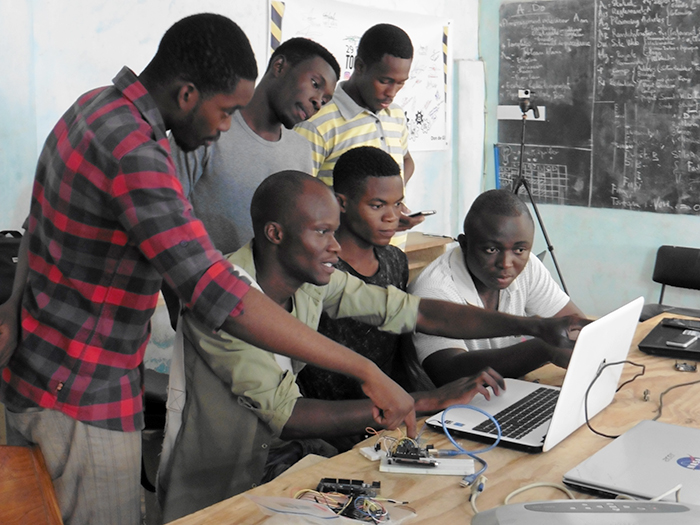
To mark the end of 2016, Ecoteclab called upon the other communities in Togo in order to offer the very first Togo Maker Fest on December 29 and 30. On the program, alternately throughout the two days: 1 hour of workshop, 1 hour of presentation of projects and initiatives. Twenty odd tinkerers made the trip—I was one of them.
“Here, we consume too much, we must be actors and do things by ourselves! Ecoteclab is above all a community, we find our solutions together.”
Ousia Foli-Bebe, co-founder of Ecoteclab
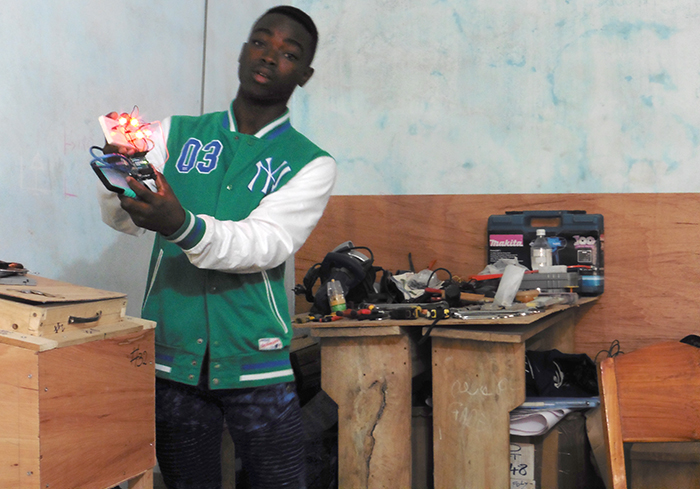
Yves Daté, in senior year of high school and budding genius of Arduino, presents his automated traffic light. His latest toy: switching the light off with his smartphone. Passionate about lighting effects, he was tinkering with integrated circuits before discovering at his component seller’s an Arduino card. He learned everything on Internet at the Internet café.

Woora Makewould like to commercialize the Wafate, the 3D printer made from computer waste that we no longer present. His intervention is causing a vast debate on innovation and entrepreneurship in Togo.
Eco-DIY
Enough chatting, let’s DIY. The teams are formed around three projects: a person-counter with Arduino, the fabrication of a mini-windmill from broken fans, the automation of water distribution at the pump. Actually, most Togolese go and get basins of water at the neighborhood borehole, which requires the presence of an administrator (often a child of the household) in order to collect the money and check the water distribution. But when everyone is away from home, the neighbors no longer have access to water… Thanks to a system of tokens to purchase, and with the help of sensors and Arduino, the idea is to offer an automatic kit.
“Auntie Makita is here for you guys, if needed!”
Ousia Foli-Bebe, co-founder of Ecoteclab (about the drill)
After a glass of bissap juice and a spicy dish of akpan and fish, we resume our activities in good spirits: cartography awareness with Open Street Map, creating one’s library with Raspberry Pi, documenting one’s project.
Léonce Atanley, the Arduino and 3D printing mad maker, sets off general hysterical laughter by showing us a photo of his student room in Ghana, or rather his Micro P lab no less than 12 printers in his cupboard are charged by a solar panel in case of a power cut, shelves are hung everywhere on the walls, a workbench goes almost all the way round the small bedroom and… there is virtually no more space for the bed! “I have everything in my room: 3D print, laser, he explains. The guys next door don’t sleep because of the noise in my room!”
Mawusee Foli-Awli, passionate about education, ends this first edition of the Togo Maker Fest by a detailed explanation of the Creative Commons licenses. With his Francocar project, he wishes to raise awareness of the importance of digital content in Africa, inform and deliver trainings relating to content creation tools and promote CC licenses in the sub-region. “Free software is the best thing that happened to us in Africa, he says. You can join any community and learn a lot from others.”
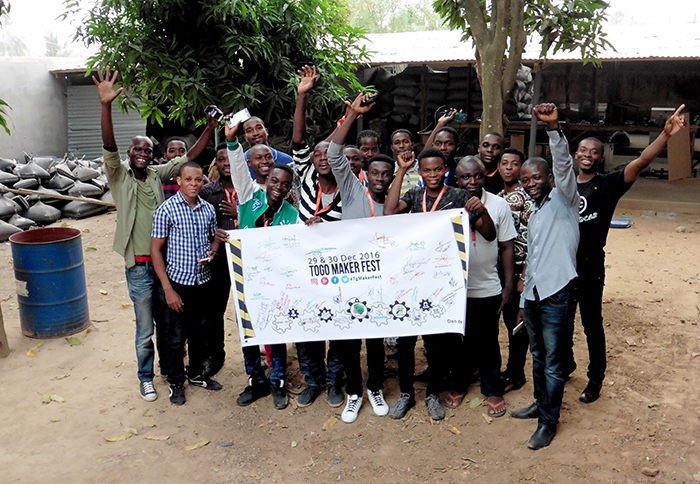
Owing to time constraints, at the end of the Togo Maker Fest, the three projects remain unfinished. But Ecoteclab is leaving its door wide open to come and finish them! The makerspace is teeming with projects for 2017. On the menu: more environmental data collected thanks to the prototyping of a weather station, a dryer project for the food-processing industry, hacking of an electricity meter to record the variables of consumption and allow for a better energetic efficiency, the introduction of “tech Arduino green” workshops with children and the organization of DIY camps during the school holidays.
The Ecoteclab association, that will file the articles of the association at the end of January, intends to offer its expertise to provide basic equipment for the lab: several additional Arduinos, a router, handheld power tools, a Wafate, etc. Next major step: setting up the space, welcoming, like this community. With the same philosophy as their elder brothers of the Ouagalab, in Burkina Faso that they are planning to visit in 2017, and tremendous determination, no doubt that their makerspace will become big.
